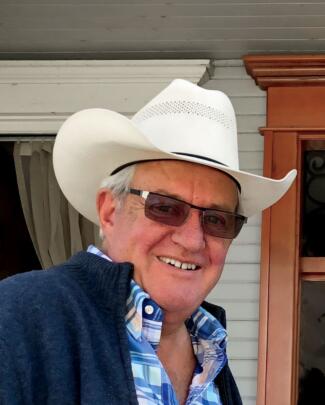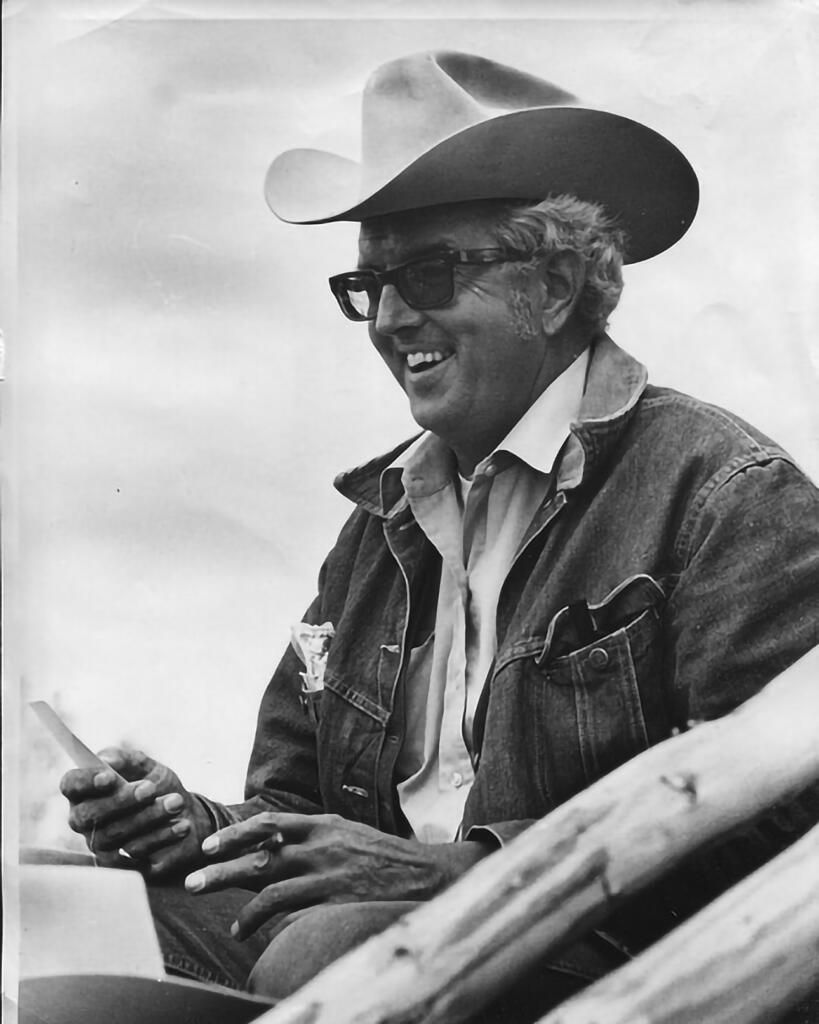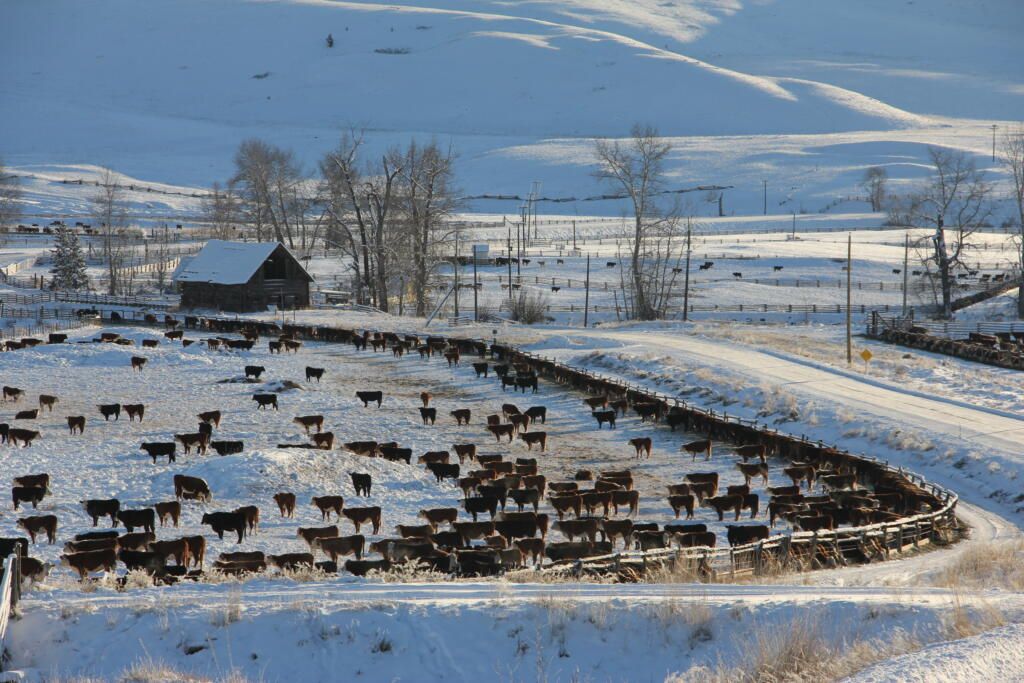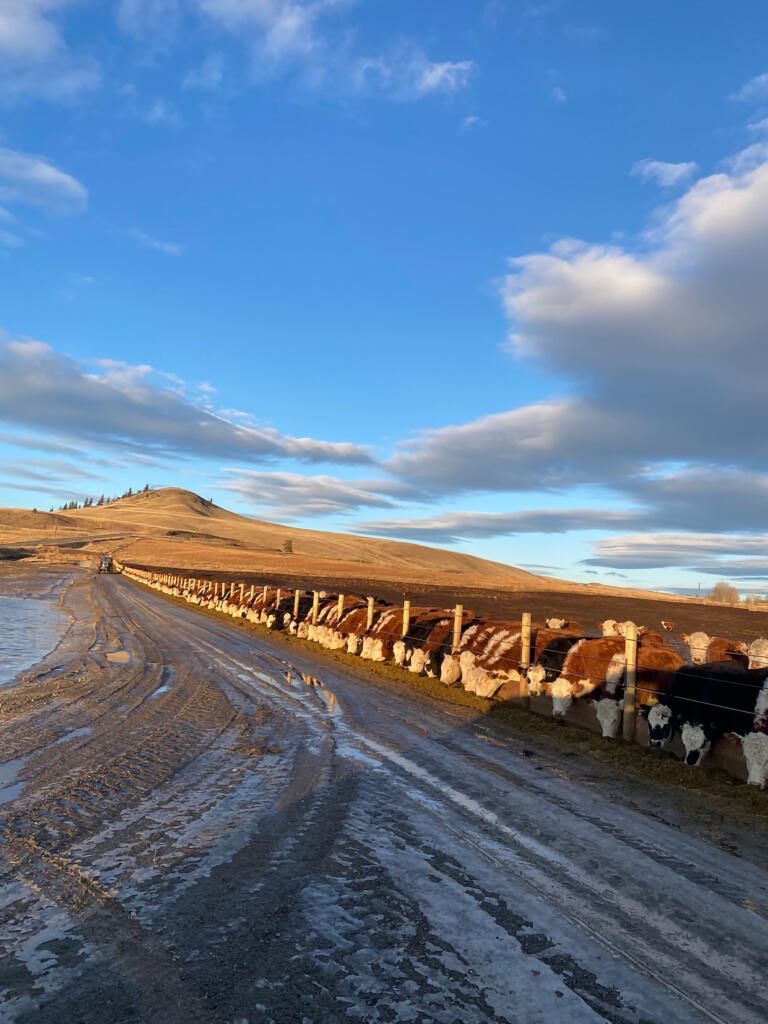Working with the environment
Douglas Lake Ranch: Empire of Grass
by Donna (Yoshitake) Wuest with Joe W. Gardner
Madeira Park: Harbour Publishing, 2023
$50.00 / 9781990776427
Reviewed by Matthey Downey
*

The Douglas Lake Ranch, the largest in Canada, has a history that nearly extends back to British Columbia’s year of confederation with the Dominion of Canada. Donna Wuest’s book, Douglas Lake Ranch: Empire of Grass, recounts the progressive expansion and development of the titular cattle ranch in what resembles a corporate family album. Wuest’s writing, supplemented heavily by the recollections of longtime Douglas Lake manager Joe Gardner, relates the ranch’s story in a personal style that grants a friendly official character to its operations. Wuest firmly roots her book’s subject as a Western Canadian cultural institution. The ranch’s integral position in the province is symbolized by descriptions of the company’s responsible practices as a hub for local flora and fauna. In all, Wuest’s clean yet endearing picture of Douglas Lake Ranch will prove a worthy fixture of any cowboy’s coffee table west of Winnipeg.

Central to Wuest’s message is the importance of the personal connection of Douglas Lake’s appeal to its employees and owners alike. The long gruelling days endured by cowboys, cooks, and construction workers on the ranch are not fuelled by financial enticements but by the lifestyle and community they share. Similarly, successive owners and investors of the ranch were not necessarily enticed by the substantial responsibilities and unstable markets to which the cattle business is perpetually tied to, but by its status as a ‘trophy property’ in line with the geographical and temporal extent of its influence.

This book is anchored by the personalities at the heart of the Douglas Lake Cattle Company, such as Brian Chance, the enigmatic Australian manager whose tenure saw high profile visits from figures such as Prince Phillip. A central presence in this modern history of the ranch is the man who also co-features in the book’s authorship, Joseph Gardner, manager from 1979 to 2019. Alongside longtime owner Charles ‘Chunky’ Woodward, of the now-defunct Western Canadian retail dynasty, Gardner piloted Douglas Lake as deftly as he did his Cessna 185 floatplane. The narrative created by the ranch’s owners’ and managers’ business history is supplemented by various vignettes of several employees and their families over the years. Past employees and associates mentioned include a notorious train robber, a lieutenant governor, and the Duke of Westminster. However, Wuest makes sure to give due attention to the everyday workers and families, from cooks to caretakers, who give life to the operation.

The focus on personalities over business details extends to descriptions of Douglas Lake’s successful mergers with and purchasing of several other ranches in the recent past; these mergers with rival ranches are identified with their owning families and are presented rather like marriages. In such a way, this ‘empire of grass’ diplomatically expanded its frontiers in a way that nearly resembles the 16th century Habsburgs. That being said, the personal focus is a fantastic way to accessibly communicate the history of a company as iconic as this.
The personal edge of Wuest’s book highlights what is identified as the individual environmental responsibility of Douglas Lake in conjunction with its uniquely vast position in the British Columbian interior. While cattle ranches are often one of the main focuses of climate change criticisms, Wuest makes sure to emphasise Douglas Lake’s intentional actions to preserve the natural environment through responsible grazing and the closing-off of public access. Declared as one of British Columbia’s best preservers of its native bluebunch wheatgrass, Douglas Lake is also home to a number of British Columbia’s endangered species, such as the American Pelican. Empire of Grass is truly an apt subtitle, as environmental protection is portrayed as going hand in hand with the business of cattle ranching at Douglas Lake.

Photo Brent Gill
The responsible practices of Douglas Lake are shown as a constant presence throughout its decades of various projects, from breeding draft horses to an experimental fallow deer farm. Such environmental focuses are met with an evidently friendly and responsible relationship with the ranch’s neighbouring First Nation, the Upper Nicola, from whom they have regularly hired workers. Such culture of environmental stewardship is reflected in Wuest’s description of Douglas Lake’s two main supplementary forms of income besides cattle: logging and recreational tourism. In all areas, the preservation of the environment is described as a primary consideration; all three, cattle, forestry, and tourism, are shown as symbiotic. This ranch works with its environment, rather than replacing it. In its logging practices, the ranch is shown to limit and space out its harvesting of timber in a way that leaves room for cattle grazing in between. The recreational activities, such as fly fishing of specially-raised trout, is also limited and controlled (sometimes at the risk of legal action from the public), with facilities likes lodges and yurts providing public access to the ranch scenery.


Wuest therefore portrays Douglas Lake as a beneficial environmental and cultural force, directly combatting any stereotypes about cattle ranching being a monolithic pseudo-industrial force bent on scorching the natural environment and replacing it with corn and cow. Wuest’s characterisation of Douglas Ranch is that it is one of the last private vestiges of the ordered and communitarian frontier spirit that first established this province as a bulwark against the wild west to the south.
Donna Wuest’s testament to the people at the heart of Canada’s largest cattle ranch therefore captures the ideal spirit of such an expansive operation by making familiar the personal drive behind each individual involved in its top administration. As an acknowledgement of the importance of the cattle ranching business to the politics, culture, and ecology of British Columbia, this book is significant. With lieutenant governors, members of the Royal family, and infamous American train robbers all being involved in the same business, it is no wonder that the story of Douglas Lake Ranch has such a peculiar charm.

*

Matthew Vernon Downey is an independent writer and researcher based out of Victoria, British Columbia. He has degrees from UVic (BA hons) and the London School of Economics (MSc) [Editor’s note: Matthew Downey has also recently reviewed books by Mike Whalen, D.C. Reid, Alexander Globe, Angus Scully, David Giblin, and Bill Arnott for The British Columbia Review.]
*
The British Columbia Review
Interim Editors, 2023-24: Trevor Marc Hughes (non-fiction), Brett Josef Grubisic (fiction)
Publisher: Richard Mackie
Formerly The Ormsby Review, The British Columbia Review is an on-line book review and journal service for BC writers and readers. The Advisory Board now consists of Jean Barman, Wade Davis, Robin Fisher, Barry Gough, Hugh Johnston, Kathy Mezei, Patricia Roy, Maria Tippett, and Graeme Wynn. Provincial Government Patron (since September 2018): Creative BC. Honorary Patron: Yosef Wosk. Scholarly Patron: SFU Graduate Liberal Studies. The British Columbia Review was founded in 2016 by Richard Mackie and Alan Twigg.
“Only connect.” – E.M. Forster
4 comments on “Working with the environment”